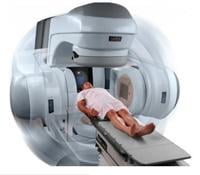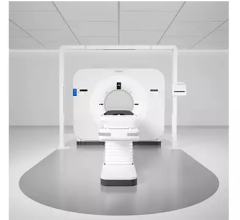
August 9, 2011 – RapidArc radiotherapy from Varian Medical Systems can be used to treat patients with blood cancers by quickly and accurately delivering "clinically favorable" total marrow irradiation (TMI), according to a team of noted cancer treatment experts who spoke at the 2011 joint meeting of the American Association of Physicists in Medicine (AAPM) and the Canadian Organization of Medical Physicists (COMP) in Vancouver last week. Their recent study on this topic, which is available online as an article in press ahead of publication, is slated to appear in an upcoming issue of the International Journal of Radiation Oncology*Biology*Physics.(1)
"Compared to conventional IMRT and tomotherapy, RapidArc appears to improve on the dose distribution, in terms of normal tissue sparing, as well as on the efficiency of treatment," said Bulent Aydogan, Ph.D., associate professor of medical physics at the University of Chicago and the director of medical physics at the University of Illinois at Chicago.
Aydogan and his collaborators planned and delivered, in their recent dosimetric feasibility study, RapidArc TMI treatments for six patients, and subsequently compared the treatment plan parameters, including median dose, mean dose, and maximum dose, to fixed-gantry and tomotherapy plans for the same cases. They found that RapidArc produces dose distributions that are comparable to conventional intensity-modulated radiotherapy (IMRT) in terms of target coverage, but with improved normal tissue sparing.
The RapidArc treatments could also be delivered much more efficiently, requiring approximately 18 minutes once a patient was positioned for treatment. By comparison, treatment times of 45 to 50 minutes have been reported for TMI delivered using conventional IMRT(2) and tomotherapy.(3)
"The data presented in this study demonstrate the utility of RapidArc technology in providing exceptional target coverage and normal tissue sparing even for difficult techniques like TMI," the study authors said. Based on their findings, the authors are planning to test the clinical feasibility of RapidArc for treating patients with multiple myeloma at the University of Chicago.
Radiotherapy, in combination with chemotherapy, can be used to destroy tumor cells and suppress the immune system in preparation for a bone marrow transplant. Healthy bone marrow stem cells are then infused into the patient's bloodstream. The new cells migrate to the bone cavities and begin producing normal blood cells.
"Historically, radiation oncologists used total body irradiation, or TBI, to prepare patients for these transplants. But TBI is not ideal, as it targets the entire body and causes too much damage to surrounding healthy tissues and organs, especially at dose levels high enough to be effective," said Aydogan. "Our studies have examined the feasibility of using linear accelerators to deliver intensity-modulated radiotherapy (IMRT) to target not the whole body, but the bone marrow, and to minimize exposure of surrounding organs like the lungs, heart, liver, kidneys, brain, eyes, oral cavity and bowel."(4)
As part of a Phase I clinical trial at the University of Illinois at Chicago (UIC), Aydogan and his colleagues have collaborated with Damiono Rondell, M.D., professor of hematology oncology and the director of stem cell transplant program, to treat seven patients with advanced disease using intensity-modulated total marrow technique (IM-TMI). "The major drawback of the IM-TMI technique is the amount of time it takes to deliver the treatment. In this latest study, we looked specifically at RapidArc and found it to be a viable approach for accomplishing TMI within a clinically acceptable timeframe," Aydogan said.
"While patients at high risk of hematologic malignancy often do better after stem cell transplants, they still have had a high rate of disease relapse, particularly when treated using radiation-free regimens," Aydogan said. "We are hopeful that TMI will enable us to add targeted radiotherapy into the mix, for a better chance at disease-free survival with fewer complications."
Research summarized in this announcement was supported, in part, by a research grant from Varian Medical Systems. Since the technology was introduced in 2007, over 1,000 RapidArc radiotherapy-enabled systems have been installed at hospitals and clinics around the world. RapidArc treatment plans are produced using Varian's Eclipse treatment planning software, which is cleared by the U.S. Food and Drug Administration (FDA) for planning photon, electron, and proton beam radiotherapy for patients with malignant or benign diseases.
For more information: www.varian.com
References:
(1) Bulent Aydogan, Ph.D. et al. “Tital Marrow Irradiation with RapdiArc Volumetric Arc Therapy.” Int J Radiat Oncol Biol Phys 2011; Feb 22. Epub ahead of print. doi:10.1016/j.ijrobp.2010.11.035.
(2) Wilkie JR, Tiryaki H, Smith BD, et al. “Feasibility study for LINAC-based intensity modeulated total marrow irradiation.” Med Phys 2008;35:5609–5618.
(3) Wong JY, Rosenthal J, Liu A, et al. “Image-guided total-marrow irradation using helical tomotherapy in patients with multiple myeloma and acute leukemia undergoing hemotopoietic cell transplantation.” Int J Radiat Oncol Biol Phys 2009;73:273–279.
(4) Mete Yeginer Ph.D. et al. “Linear Accelerator-Based Intensity-Modulated Total Marrow Irradiation Techniques Treatment of Hematologic Malignancies: A Dosimetric Feasibility Study.” Int J Radiat Oncol Biol Phys; 2011; 79:4, 1256-1265.


 December 11, 2025
December 11, 2025 









